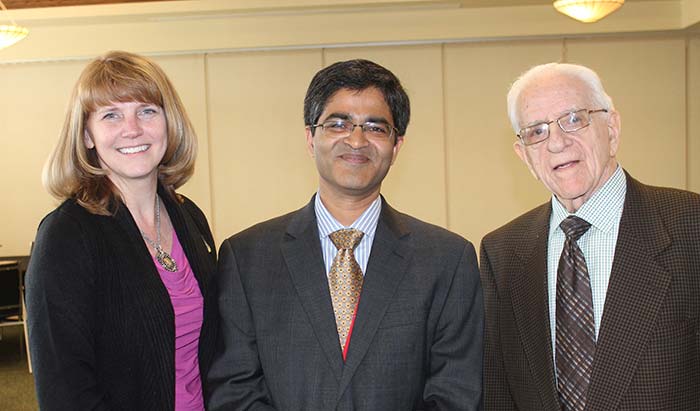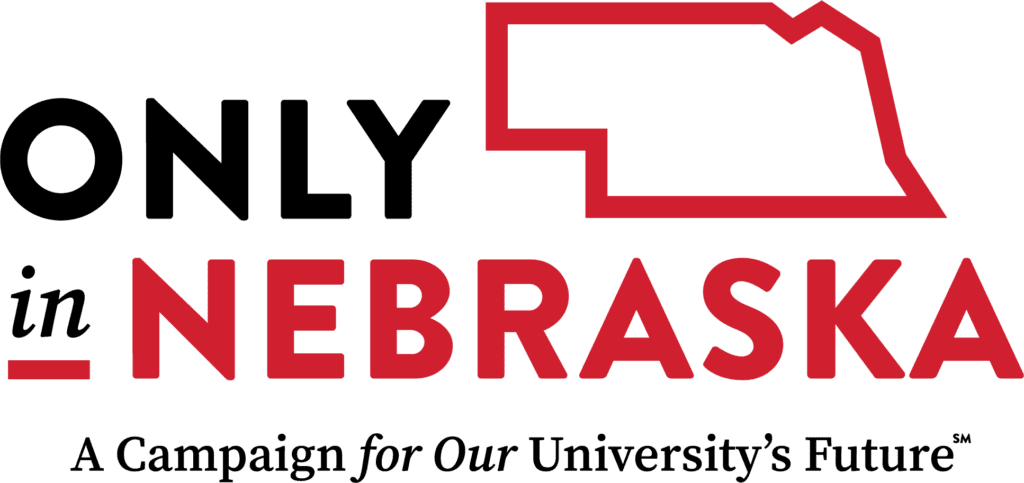Gift from Fremont organization supports promising Alzheimer’s research at UNMC

A $30,000 gift by the Fremont (Neb.) Area Alzheimer’s Committee to support innovative research at the University of Nebraska Medical Center helps augment the fight against a disease that currently affects 35,000 Nebraskans and more than 5 million people nationwide.
Alzheimer’s, a progressive, degenerative disorder, is the most common cause of dementia among people 65 years and older, according to the Alzheimer’s Foundation of America.
The gift, made to the University of Nebraska Foundation, increases the Fremont committee’s support of Alzheimer’s research at UNMC to more than $62,000 since 2013.
The most recent gift was presented today to Sachin Kedar, M.D., associate professor in UNMC’s Department of Neurological Sciences and Department of Ophthalmology and Visual Sciences, at a special presentation in Fremont.
This support will help fund development of retinal and optic nerve imaging capabilities within the UNMC Department of Neurological Sciences Mind and Brain Health Laboratory to investigate and validate retinal and optic nerve biomarkers in Alzheimer’s disease. Biomarkers are biological measures of the presence, progression and response to treatment of a disease condition.
“The goal of our study is to explore and measure changes in the eye resulting from Alzheimer’s disease,” said Dr. Kedar who specializes in neuro-ophthalmology. “Through these biomarkers we may be able to monitor the progression and stage of Alzheimer’s disease in an individual.”
He added that UNMC is grateful for the Fremont Area Alzheimer’s Committee’s generous support of cutting-edge research to fight a disease that impacts numerous Nebraskans and their families.
“These capabilities provide a unique resource for Nebraskans while positioning UNMC to be a leader in this emerging field of research,” Dr. Kedar said.
Recently published preliminary studies have identified abnormalities of retinal tissue, reading difficulty and eye movement disorders in people with early Alzheimer’s disease. These studies also support the idea that ophthalmic biomarkers can be used to monitor Alzheimer’s patients’ response to treatment.
“The retinal and optic nerve imaging capabilities developed with this private support builds on a robust, state-of-the-art infrastructure in ocular imaging which exists at the Stanley M. Truhlsen Eye Institute on the UNMC campus,” Dr. Kedar said. “It also will allow UNMC’s neurology centers to become one of just a very few in the country to provide ophthalmic imaging for research and clinical purposes.”
Once the capabilities are in place, UNMC will conduct pilot studies of individuals with varying severity of Alzheimer’s disease to validate the ophthalmic biomarkers.
Marv Welstead, a member of the Fremont Area Alzheimer’s Association, has a special interest in advancing promising Alzheimer’s research. Welstead lost his wife to Alzheimer’s disease nearly five years ago after her eight year struggle with the disease.
“My goal is to make the public aware and help us in finding a cure for Alzheimer’s or at least delaying its progression,” he said. “I am convinced if we discover the disease early enough in a patient and combined that with the new medicines coming on the market, the disease can be delayed, just like a heart patient who takes aspirin and a diabetic who takes insulin.
“We believe that with the proper equipment scientists and doctors can determine the plaque in the retina of the eye in the disease’s early stages and thus, with medicine, delay the progress of Alzheimer’s. We’re confident in what Dr. Kedar’s study can accomplish and have provided this funding to help move the project forward.”
Each year the Fremont Area Alzheimer’s Committee presents an annual walk event to raise support for Alzheimer’s research and for caregiver education. The 2015 Memory Walk is scheduled for
Oct. 3, at Midland University in Fremont.
The University of Nebraska Foundation is an independent, nonprofit organization raising private gifts to support the University of Nebraska for more than 79 years. Last year, donors provided the university with $258.1 million for scholarships, academic programs, medical and other research, faculty support and facilities.




